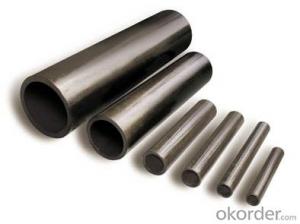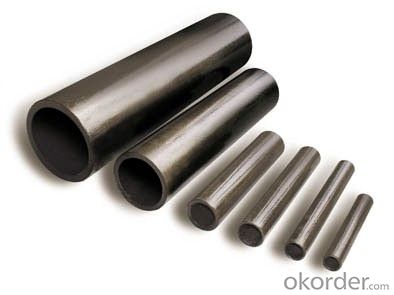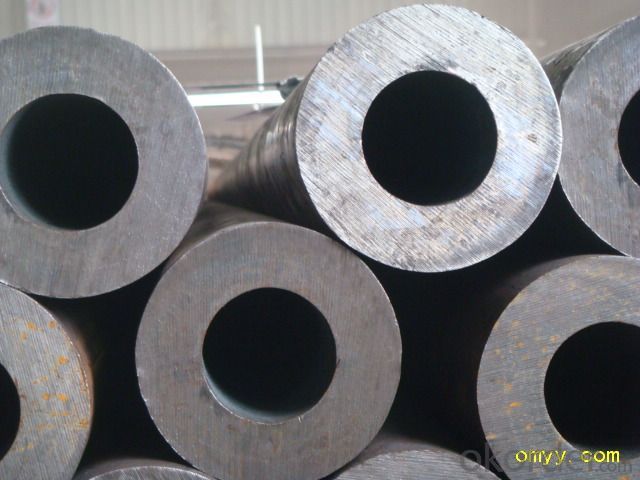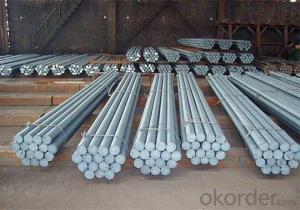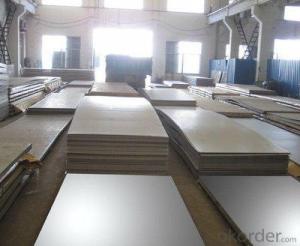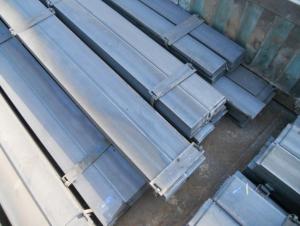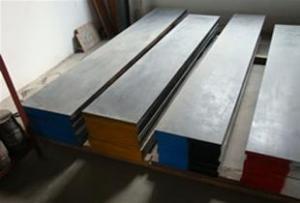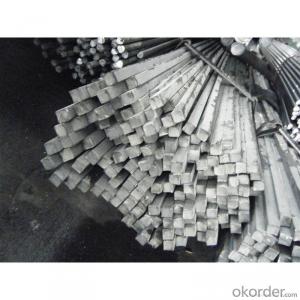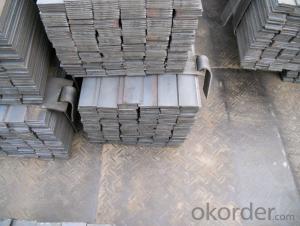30CrMnSi Material High Quality Tool Steel Bar
- Loading Port:
- China main port
- Payment Terms:
- TT or LC
- Min Order Qty:
- 25 m.t.
- Supply Capability:
- 10000 m.t./month
OKorder Service Pledge
OKorder Financial Service
You Might Also Like
Product Description:
OKorder is offering Tool Steel at great prices with worldwide shipping. Our supplier is a world-class manufacturer of steel, with our products utilized the world over. OKorder annually supplies products to European, North American and Asian markets. We provide quotations within 24 hours of receiving an inquiry and guarantee competitive prices.
Product Applications:
High Quality Bearing steel is used for manufacturing ball, roller bearing steel and rings. Bearing in work is under great pressure and friction, so have high demands bearing steel and hardness and resistance, and high elastic limit.
Bearing steels are used for ball and roller bearing applications and are comprised of low carbon steels and high carbon through harden able steel.
For example, bearing ring, steel rolling mill, machinery, 100Cr6 bearing steel ball is widely used in high-speed and low-noise bearing, bicycle, motorcycle, automobile, bags electronically.
Product Advantages:
OKorder's Tool Steel are durable, strong, and resist corrosion.
Main Product Features:
· Premium quality
· Prompt delivery & seaworthy packing (30 days after receiving deposit)
· Corrosion resistance
· Can be recycled and reused
· Mill test certification
· Professional Service
· Competitive pricing
Product Specifications:
Grade | bearing steel EN-31 |
Dimensions | Diameter: 20-280mm Length: 2000-5800mm |
Shape | Round Bar |
Type | High chromium bearing steel |
HBS | <220< span=""> |
Standard | AISI |
Technique | Hot Rolled |
Chemical Composition of High Quality Bearing Steel
C | S | P | Si | Mn |
0.95-1.05 | ≤0.025 | ≤0.025 | 0.15-0.35 | 0.25-0.45 |
Cr | Mo | Ni | Cu | Ni+Cu |
1.40-1.65 | ≤0.10 | ≤0.30 | ≤0.25 | ≤0.50 |
Note of High Quality Bearing Steel
1. According to national standard (GB) for our products, if not, supply according to national standards (GB) or agreement.
2. We can not only provide electric furnace +LF+VD and electros lag re-melting (ESR) steel forging materials, but also forging products of piece, bar, etc.
3. Our company is equipped with roll equipment and can provide our customers with roll billets or finished.
4. The materials that we purchase are all accord with International General Standard; you could check it out on the Material Quality Sheet.
5. We are the creator of the “seven-step inspect method” in China.
6. The technical workers we employed are the ones with many years’ working experience, who know the technology procedures very well.
7. We will strictly inspect our production that we sold according to the customer’s request.
8. Our steel reaches international quality standards. Besides, our company is equipped with large-sized vertical saw machines, horizontal saw machines, milling machines, grinding machines and other advanced equipment. All our products are carried out hardness tests, such as the ultrasonic flaw detection before shipment. Therefore, there is no quality problem. With more competitive price than other suppliers, our steel has good sales in the markets of North America, South America, East Europe, Southeast Asia, Africa, Oceania, the Middle East, East Asia and West Europe.
FAQ:
Q1: Why buy Materials & Equipment from OKorder.com?
A1: All products offered byOKorder.com are carefully selected from China's most reliable manufacturing enterprises. Through its ISO certifications, OKorder.com adheres to the highest standards and a commitment to supply chain safety and customer satisfaction.
Q2: How do we guarantee the quality of our products?
A2: We have established an advanced quality management system which conducts strict quality tests at every step, from raw materials to the final product. At the same time, we provide extensive follow-up service assurances as required.
Q3: How soon can we receive the product after purchase?
A3: Within three days of placing an order, we will begin production. The specific shipping date is dependent upon international and government factors, but is typically 7 to 10 workdays.
Images:
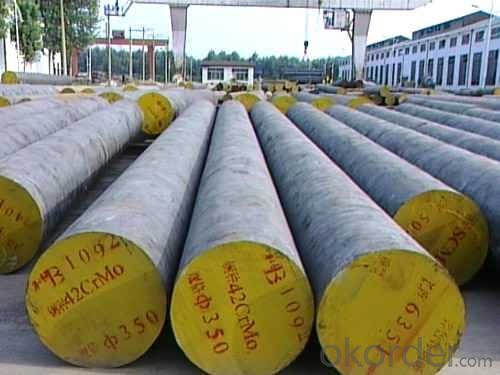
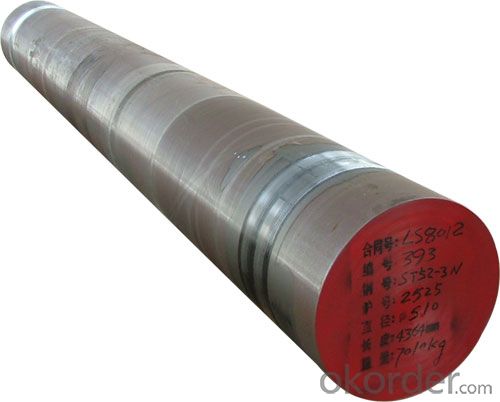
- Q: Can steel round bars be used in the manufacturing of shafts?
- Shafts can indeed be manufactured using steel round bars. The utilization of steel round bars for shaft production is common owing to their remarkable mechanical properties, durability, and high strength. The bar's circular form facilitates the machining and forming procedures, rendering it appropriate for producing shafts of diverse lengths and sizes. Moreover, heat treatment can be applied to steel round bars to augment their hardness, strength, and resistance to wear, thus enhancing their suitability for shaft applications.
- Q: How about tempering No. 45 round bar?
- Quenching and tempering is the double heat treatment of quenching and high temperature tempering, the purpose is to make the workpiece have good comprehensive mechanical properties.
- Q: What is the modulus of elasticity of a steel round bar?
- Young's modulus, also known as the modulus of elasticity, is a crucial measure when assessing the stiffness and ability of a steel round bar to resist deformation under an external force. Generally, the modulus of elasticity for steel is around 200 GPa. Consequently, when a unit of stress is applied to the steel round bar, it will undergo an elastic deformation ranging from approximately 0.0035 to 0.005, depending on the specific grade and composition of the steel. Hence, the modulus of elasticity plays a significant role in structural and mechanical engineering applications, as it dictates the level of deflection or deformation to be expected under various loading conditions.
- Q: What is the elasticity of a steel round bar?
- The ability of a steel round bar to return to its original form and size after external forces or deformations is referred to as its elasticity. Steel is renowned for its high elastic modulus, indicating its resistance to deformation and ability to withstand significant stress before permanently bending or breaking. The composition of a steel round bar, specifically its carbon content and the inclusion of other alloying elements, determines its elasticity. Generally, steel with higher carbon content possesses greater elasticity and can be more easily manipulated without enduring permanent deformation. Nonetheless, it is noteworthy that factors like temperature, strain rate, and any defects or imperfections in the material can also influence the elasticity of a steel round bar.
- Q: What is the typical price range for steel round bars?
- The cost of steel round bars can differ based on several factors, including size, quality, and source of purchase. Generally, smaller diameter bars can be priced between $10 and $30 per bar, while larger ones can range from $30 to $100 or higher. The steel's quality, including its grade and any additional treatments or finishes, can influence the price. Moreover, the price range can be affected by the location or supplier from which the bars are bought. To obtain the best possible deal, it is advisable to compare prices from multiple sources and consider factors like shipping costs.
- Q: Can steel round bars be used in the production of forgings?
- In the production of forgings, steel round bars can be utilized. These round bars are commonly employed as the primary materials in forging procedures. To shape them, the round bars are heated to a specific temperature and then subjected to diverse forging techniques like hammering, pressing, or rolling. Through the application of heat and pressure during the forging process, the mechanical properties of the steel are improved, rendering it stronger and more enduring. Steel round bars are highly suitable for forging production as they ensure a consistent and uniform shape, guaranteeing that the final product adheres to the required specifications. Furthermore, steel round bars offer versatility in terms of their size, grade, and composition, allowing for a wide range of applications across various industries such as automotive, aerospace, and construction.
- Q: Can steel round bars be used in the production of construction equipment?
- Steel round bars are indeed capable of being utilized in the production of construction equipment. The construction industry frequently relies on steel round bars for their exceptional characteristics, including strength, durability, and versatility. These bars can be effectively employed in the creation of various construction equipment components, such as axles, shafts, gears, and structural supports. Thanks to their remarkable tensile strength, steel round bars ensure that the equipment can effectively endure heavy loads and challenging operating conditions. Furthermore, their machinability and weldability render them highly suitable for the fabrication processes involved in manufacturing construction equipment. All in all, steel round bars represent a reliable and extensively used material within the construction industry for the production of construction equipment.
- Q: Can steel round bars be used for shafts or axles?
- Yes, steel round bars can be used for shafts or axles. Steel round bars are commonly used for these applications due to their high strength, durability, and ability to withstand heavy loads and torsional forces. They can be machined and shaped to fit specific requirements, making them suitable for various industrial and mechanical applications.
- Q: What are the different types of steel alloy compositions used for round bars?
- Round bars are made from various steel alloy compositions, each with its own unique properties and applications. Some commonly used compositions include carbon steel, alloy steel, stainless steel, tool steel, duplex steel, and high-speed steel. Carbon steel is the basic and widely used type, consisting primarily of iron and carbon. It is known for its strength, durability, and affordability. Alloy steel, on the other hand, contains additional alloying elements like manganese, chromium, nickel, or molybdenum. This gives it enhanced strength, hardness, and resistance to wear, making it suitable for high-performance applications. Stainless steel, composed mainly of iron, chromium, and nickel, offers excellent corrosion resistance. It is ideal for environments with high moisture or chemical exposure, and it is often used in architectural and decorative applications. Tool steel is designed for exceptional hardness, toughness, and wear resistance. It is commonly used in the production of cutting tools, dies, and molds. Elements like tungsten, vanadium, or cobalt are added to enhance its performance. Duplex steel is a balanced combination of austenitic and ferritic microstructures. It provides excellent strength and corrosion resistance, making it suitable for demanding environments like the offshore oil and gas industry. High-speed steel is engineered to withstand high temperatures and maintain hardness and toughness at elevated speeds. It is frequently used in the production of cutting tools, drills, and milling cutters. Compositions containing elements like tungsten, molybdenum, or cobalt are typically used. These examples represent just a few of the steel alloy compositions available for round bars. The choice of composition depends on the specific application, desired properties, and performance requirements.
- Q: Are steel round bars suitable for conveyor belt applications?
- Depending on various factors, conveyor belt applications can benefit from the use of steel round bars. These bars are renowned for their strength, durability, and resistance to wear and tear, making them a viable choice for applications involving heavy loads, high speeds, or abrasive materials. One of the main advantages of utilizing steel round bars in conveyor belt applications lies in their ability to withstand heavy loads. Their strength ensures that the bars can support the weight of conveyed materials without bending or breaking. This is particularly crucial in industries where continuous transportation of large quantities of bulky or heavy materials is required. Moreover, steel round bars exhibit high resistance to wear and tear. The smooth surface of the bars reduces friction, resulting in minimal wear on the conveyor belt and prolonging its lifespan. This is especially important in applications where the conveyor belt constantly moves and comes into contact with abrasive materials, such as in the mining or construction industries. Additionally, steel round bars are capable of withstanding high speeds without compromising their structural integrity. Their high tensile strength enables them to handle the forces exerted on the conveyor belt during acceleration or deceleration. As a result, the conveyor system operates smoothly and efficiently, reducing downtime and enhancing productivity. However, it is crucial to consider the specific requirements of the conveyor belt application when selecting steel round bars. Factors such as the type of conveyed materials, the operating environment, and the specific load and speed requirements should be carefully evaluated. In certain cases, alternative materials or coatings may be necessary to enhance the performance and longevity of the conveyor system. In conclusion, steel round bars can be a suitable choice for conveyor belt applications due to their strength, durability, and resistance to wear and tear. Nonetheless, careful consideration of the specific application requirements is essential to ensure optimal performance and longevity of the conveyor system.
Send your message to us
30CrMnSi Material High Quality Tool Steel Bar
- Loading Port:
- China main port
- Payment Terms:
- TT or LC
- Min Order Qty:
- 25 m.t.
- Supply Capability:
- 10000 m.t./month
OKorder Service Pledge
OKorder Financial Service
Similar products
Hot products
Hot Searches
Related keywords
